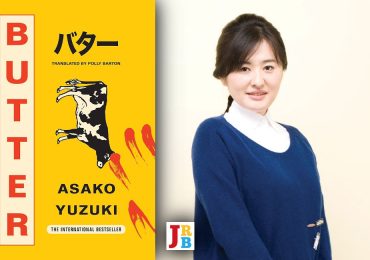The following piece was written in 2006, since when it has been languishing on the author’s blog. It was revived and read by the author at the celebration of JM Coetzee’s eightieth birthday at Amazwi: South African Museum of Literature (formerly the National English Literature Museum) in Makhanda. It’s publication comes with a ‘cautious recommendation’ from Coetzee himself.
The man who would be eaten
One day, I joke with friends: ‘If you were a cannibal, which author would you eat and which herb would you use?’ I almost immediately go for JM Coetzee, slow-roasted over coals, and simply but deftly flavoured: salt, pepper, tarragon. Now, every time I have eggs benedict, I think of slow-roasted Coetzee and tarragon.
It has to be him. He’s getting on, but with his vegan diet, the flesh, I imagine, will be tender and sweet, and untarnished by, say, the shit such as most of us eat. Tender, but maintaining structure with its cycling muscles. ‘No, a crispy bit of tarragon-flavoured Coetzee would be good,’ I muse. And a red that has some depth, but is not too metaphysical; a deep but reticent, reluctant red.
One friend rolls his eyes at my predictability. Of course I would say Coetzee. My friend is a Paul Auster fan, see, but I cannot imagine that he would want to eat Auster. Certainly, he would find gustatory joy in authors—even perhaps stray from the literary and tuck into some roasted Nigel Mansell (with crackling)—but I doubt Auster would be his eat of choice. I can’t imagine eating Paul Auster at the kind of dinner I imagine, of roasted Coetzee.
Look, this is about eating, not reading, so I can imagine in a more casual moment having pastrami of Auster, shredded, on rye, with the gamut of New York fixings and a sharp mustard. To make it better, an ice cold Coke.
The thing is, whenever a bunch of literary types in Cape Town get together, they talk about food and wine and books, and then Coetzee. Every literary conversation or conversation about literature held in Cape Town, I swear, has to include Coetzee—Why Adelaide? Is the cycling there better? How’s about that Eugene Dawn, huh?
Okay, how do I make this a reasonably solid sociological claim? It may not be that every literary conversation ends up with talk about Coetzee. But then they would not be literary conversations proper, would they? The point is, in almost every literary conversation of which I have been part during the last ten years or so, with a diverse range of literary types, the talk always included or ended up with Coetzee.
Then another friend and I developed this thesis: in a Cape Town literary conversation, from the most basic to the most sophisticated, most urbane and wide-ranging ones, Coetzee will be a topic sooner or later. But we ourselves talked about him a lot, so it could be that our thesis simply described our own obsession and could not found a universal theory of literary conversation in Cape Town. By the mid-nineteen-nineties, that kind of all-encompassing grand theory would in any case have been viewed with much scepticism and ridicule in (to post-structuralists) finally deconstructing Cape Town.
Furthermore, in these other conversations, of which we may have been part, and on which we based our thesis, could it be that we were the ones to introduce Coetzee and thereby have always already tainted data? No. Other people were well capable of doing this without any prompting from Coetzee fans. Even people who hated him talked about him.
(You’ll know that ‘him’ or ‘Coetzee’ stands metonymically for his books, unless we are talking about eating him. Then we mean the mortal body and possibly the person.)
So, I thought I’d combine him absolutely. Make food out of him.
Some people hate him; I disliked Disgrace because it was so tight, I swear that if one took one article out, the whole edifice would collapse. (I haven’t read Slow Man yet, which makes me think of a slow-cooked man.) So, some people hate him, but it was something special to have him wander Cape Town; to see him come out of Checkers with his small Checkers bag, in his neat trousers, sensible shirt and short, small leather jacket. You just knew that some masterpiece was going to be forming later as he washed and grated his carrots. Maybe he had some chillies in there.
I think he likes chillies. In ‘Meat Country’ (Granta, 1995), he rhapsodises about a dish of chillies and rice, a craving he has while cycling out in the Texan sun. Not, strangely, watermelon, lettuce, the cold and moist, he says, but fiery chillies.
If I wasn’t going to eat him, I think maybe I’d cook him some rice and chillies, a great platter of it with roasted flakes of almond, and raisins, onion, pine nuts, cilantro, saffron. And the chillies: long fresh green ones, red ones, dried ones, smoked ones. Some sweet red and yellow peppers. More vegetables maybe. Julienne of celery and carrot. Caramelised tomato. To drink: clear, crisp water. It’s actually some years now that I have thought of cooking him that dish, ever since reading ‘Meat Country’.
I repeat this joke—cannibal, who to eat?—in a class for third years. By God, by now they should have a sense of irony. We had been talking about the Spanish and Portuguese in the New World, stories about native cannibalism. Then I ask, as an aside: ‘Mmm, who in the English Department would you eat if you were a cannibal? Which herb?’
Silence. I say that I would go for Coetzee and tarragon. Some laugh and shake their heads; some don’t know who he is; and some are mortified and shift uncomfortably in their chairs. It is clear they find it offensive.
I, of course, backpedal. Laughing, I insist: ‘Look, I’m not a cannibal. That’s what’s called a joke.’ I shake my head: ‘It’s a strange joke, that’s all.’ Back to the Spanish and Portuguese in the New World and metonyms and the disjecta membra and coercion and so on and so forth.
Some of you may think I am really strange, weird, ‘sicko’. But I am quite normal. I just wonder what Coetzee would taste like, slow-roasted, with tarragon.
And some of you may think I dislike the man. Why eat him? But I am actually a fan. A johnny-come-lately to his fandom, yes, but a fan. And I think it’s okay to disclose my adulation, now that he’s no longer here, in Cape Town, with his Checkers bag full of chillies. As a fan, I style some of my prose after his. Or I invent a character two hundred years old who says something and then I footnote Coetzee and say how remarkable it is that, two hundred years later, the novelist Coetzee will say something similar. But that was when I was trying to eat Borges.
Now Borges, that’s a culinary challenge. Old and stringy, but with an other-worldly promise. Strong herbs and flavours are called for, but rosemary would be too predictable. Perhaps a few hours’ soaking in soya sauce and honey, then roasted and served with gremolata. The lemon zest of the gremolata perfect with the honey, yes. And since in his blindness Borges reminds me of fish, then perhaps a Sauvignon Blanc. But that, with the gremolata, might be too grassy. Maybe soya and honey is the wrong way to go. What about jugged Borges? I think we could still have the gremolata.
I can’t eat any author who did not make it into the twentieth century. That just seems wrong and carries with it all sorts of distasteful digging in the dark. Like Shakespeare. To stay in form, one would have to root around for recipes of the time, and who has time for that? But, in any case, I just have a sense of the dank and musty when I think of eating pre-twentieth century authors; like politicians, like crayfish, all who feed and scavenge in murky depths. No, no politicians and long dead authors.
Forgive me, I am working up an appetite. Who else would you eat? Carpaccio of pickled Kafka for starters or use him to make sausages for a gigantic choucroute, which will, naturally, include big chunks of smoky Southern Faulkner. Some purists may object to this, but once they taste the fusion of Southern barbecue with superior European sausage, they will finish the dish.
Robertson Davies … ? Too old and hairy. Consenting adults may indulge in titbits of powdery soft William Burroughs, but beware the after-effects.
Women authors, some might ask, where are the women authors? I hesitate here, troubled that the absence of women from my menu may mean that I am less fearless than initial impressions suggested; that, in the face of strange psychoanalytic innuendo, I steer clear of eating, say, Toni Morrison (shavings of her over a vermouth risotto), Margaret Atwood (definitely soya sauce and honey and sesame seeds, baked or grilled) or Jeanette Winterson (kebabs of her with pineapple, apricot, onion and so on and so forth. To drink, rum and Coke). Sashimi of Siri Hustvedt.
I mean, eating male authors may be a weird joke, some form of strange satire (not that there may not be read into it all sorts of strange psychoanalytic innuendo either), but eating women may have problematic political implications, most dangerously dismemberment by me, a male author. And dietary laws can be complicated, just see ‘Meat Country’.
Which brings us back to our topic of conversation, as it does, as I have said. So, yes, I am a fan of Coetzee, and if I am not starting or having a conversation about him—Yes, but Coetzee did that already in Michael K and he did this in Age of Iron, but his best novel must be The Master of Petersburg and he would be good with tarragon—if I am not talking about him, I am not talking about him.
Who else might be good with tarragon? Rushdie? Rushdie, tarragoned up and wrapped in bacon, then grilled. The bacon would make it haram, but, as Coetzee says in ‘Meat Country’, pork is ‘good even for Jews and Muslims.’
Vladislavić? Definitely. Consommé of Vladislavić, with a hint of tarragon. Melville? I can make exceptions vis-á-vis period, so … Melville, tarragon, then coated in a bland German mustard, baked for several hours at low temperature.
I wonder what whale meat tastes like?
As you can see, things get out of hand quickly with this eating business. Now I am thinking of whale meat, gobs of fat, blue-red flesh. The size of those muscles. Imagine, whale fillet with thyme, seared. But this, certainly, will get me into trouble.
© 2006/2020
- Rustum Kozain is The JRB Poetry Editor. He is the author of This Carting Life (2005) and Groundwork (2012), both of which won the Olive Schreiner Prize, as well as, respectively, the Ingrid Jonker Prize and the Herman Charles Bosman Award. His poetry has been published in translation in French, Indonesian, Italian and Spanish. Follow him on Twitter.






A vulgar and silly concept! Have you forgotten that J M Coetzee has placed before readers the heartless plight of the animals in our midst – that your “eating” so hideously calls forht.